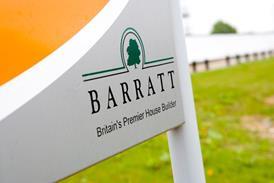We talk a lot about how to solve the housing crisis but seem to make little progress. It is therefore good to see property industry veteran, Marc Vlessing, CEO of innovative developer Pocket Living, come up with some practical suggestions.

In his column in The Times headed, ‘Can we fix the broken housing market? Yes we can, and here’s how’, he comes up with some solutions which would put the emphasis on smaller house builders once again. He says, ‘Along with Britain’s other small and medium-sized developers and builders, we stand ready to ride to the rescue and help solve the crisis. Now we need the government’s help: over to you, secretary of state.’
The housing sector is benefitting from the progress made towards establishing an institutional UK rental sector. Now, after more than a decade since Delancey retrofitted the 2020 Olympics athletes’ village at Stratford to create East Village, the first scale rental scheme in decades, the build to rent (BTR) sector, is gathering traction. According to the latest figures published by the British Property Federation (BPF), in Q4 2020, there were 179,835 units across the UK, including those complete, under construction or in planning.
This is an increase of 19% since 2019. We are also now seeing increased interest in coliving rental, which is very different from the offerings that planners tended to dismiss as ‘bedsits.’ The Collective who have been pioneers in developing and operating the new type of coliving in London, opened their first development at Old Oak Common back in May 2016.

In my recent podcast interview with Brad Hargreaves, Founder/ CEO of leading US coliving company Common, he told me that Common, who are operators rather than developers, would be coming to the UK this summer. Sure enough, MD Brian Lee is now in London to discuss opportunities. We caught up this week and he told me, ‘I’m excited to finally be on the ground in London! We’re planning to roll out two main products in the UK - BTR management and coliving management, along with design advisory for both’.
He sees the UK as a natural market for Common. He added, ‘We want to elevate the residential experience by offering renters attainably priced housing, convenience via flexible lease terms and services, and a sense of community. I think there is going to be strong consumer demand for all three things in the UK.
In the US, we get about 30,000 consumer leads per month, so we are excited to expand that sales funnel to the UK. Interestingly, we received 4,000 leads from Europe last year without doing any proactive marketing here. And the most leads came from the UK, so there is latent renter demand that we want to build on.’ As with BTR in the early days, a degree of education will be required as coliving is a concept that planners are suspicious of as they still equate it to bedsits.
Lee is on the case and says’ I’ve been working with a variety of people in the UK real estate industry. Institutional, long-term owners of BTR who need an institutional, forward-thinking operator. Entrepreneurial developers who want to redevelop existing buildings into something innovative, like coliving. And planning authorities who want to better understand Common’s approach to BTR and coliving.’
You can hear more from Lee as he is due to speak at Property Week’s RESI conference at Celtic Manor in September.
We have also talked a lot over the last few years about the demise of retail so it’s good to focus on a new retail concept which is gaining traction. Sook which describes itself as the new 21st century destination on the high street, is an agile asset management solution that blends proprietary software and an adaptable physical fit out to transform vacant retail units into customizable digital spaces which can be rented by the hour by anyone from anywhere in the world.
Founder John Hoyle describes it as ‘renting time, not space.’ You can literally book Sook by the hour and people do just that. According to Hoyle, landlords should regard Sook as an asset management tool which he says enables them to make two to three times the rent on a standard lease. The Sook model enables the landlord to receive most of the revenue from bookings so it really is an Airbnb for retail space.
Although physical retail in the UK only reopened in April, Sook has already generated £300,000+ in revenue from 100+ occupiers in 202. It has secured four more new sites to open in 2021, plus interest from international locations has ‘exploded.’ Hoyle is upbeat about the increase in take up since Covid-19 restrictions were eased, and excited about footfall generated from bookings by the likes of Love Island contestants and Depop.
They will soon be able to explore options for evening events as spaces can be rented as bars, classes, launches or even for marriage proposals! Sook’s current seed round has had overwhelming interest from pre-registered and existing investors with 70% of the round already full. Sook has certainly come a long way since I first met Hoyle at a property event back in 2019 when he told me about what sounded like a great idea!
One of the apparent successes of the Covid-19 lockdown has been the way local councils have been able harness technology to migrate their meetings online. It therefore seemed to be something of a regression when the Ministry of Housing, Communities & Local Government wrote to council leaders directing them to revert back to physical meetings from 7 May 2021. The reason cited was that the regulations permitting virtual meetings during the Covid-19 lockdown were due to end on 7 May 2021. Any extension would apparently require primary legislation and the government’s legislative programme was under severe pressure. It is therefore surprising to hear that the legislative programme does permit time for a bill to extend the rights of crustaceans. The Animal Welfare (Sentience) Bill, which is going through the House of Lords, includes an amendment to extend the legislation to shellfish and molluscs in order to make the boiling of live lobster illegal.
The book isn’t available in the UK until 22 July, so I enjoyed reading a review of the “The Cult of We” by The Real Deal’s Editorial Director, Hiten Samtani. His commentary on this new book by Wall Street Journal reporters Eliot Brown and Maureen Farrell is headed, “Emperor’s New Clothes” of the Silicon Valley age. Definitive story of Adam Neumann’s spectacular rise and fall is also the story of his enablers.’
According to Samtani’s review, Brown and Farrell write, ’WeWork’s implosion — one which saw the company’s enterprise value plummet by $40 billion, led to thousands of layoffs, killed plans for the biggest-ever venture capital fund and was a black eye for some of the world’s most renowned investors — “was enabled by a collision of forces: a man characterized by charisma, unbridled optimism and astute salesmanship met an entire financial system primed to fall under his spell.”
In a case of fact being stranger than fiction, after a series of heavy weight investors, ‘Then came SoftBank, and Son, and things just got crazier — Son was a big fan of crazy, the only person who ever told Neumann he wasn’t crazy enough. Neumann not only extracted $1.5 billion in SoftBank investment for WeWork, he cannily negotiated a supersized compensation package for himself, as well as other concessions — SoftBank could only remove him from his leadership position without penalty if he committed a violent felony. Though Silicon Valley’s growth-at-all-costs mentality and Wall Street’s coddling of it are the two main pillars of this book, there is plenty of fodder for real-estate insiders. Farrell and Brown reveal that Neumann was interested in acquiring commercial real estate giant Cushman & Wakefield as part of his quest to provide WeWork with three $1trillion arms: office space, real estate investing, and services.’
Samtani says, ’The reporters also shed new light on the much-mocked “community-adjusted EBITDA” metric that WeWork favored, breaking down how it was able to avoid “straightlining” first-year rent breaks and thus tell investors that many of its spaces were profitable.“ The average bond investor likely isn’t steeped in the intricacies of real estate leases,” Brown and Farrell write. “But the effect was extraordinary. By normal measures, WeWork’s revenue doubled to $866 million in 2017, and its losses more than doubled to $933 million that year. But using [president Artie Minson’s] new definition, WeWork had actually generated $233 million in profits.”
The colourful WeWork story will clearly keep business schools busy for some time to come. It certainly puts into the shade previous spectacular falls from grace from my time at business school, such as Enron.
Susan Freeman is a partner at Mishcon de Reya






























No comments yet